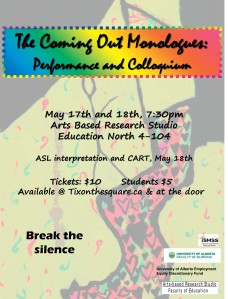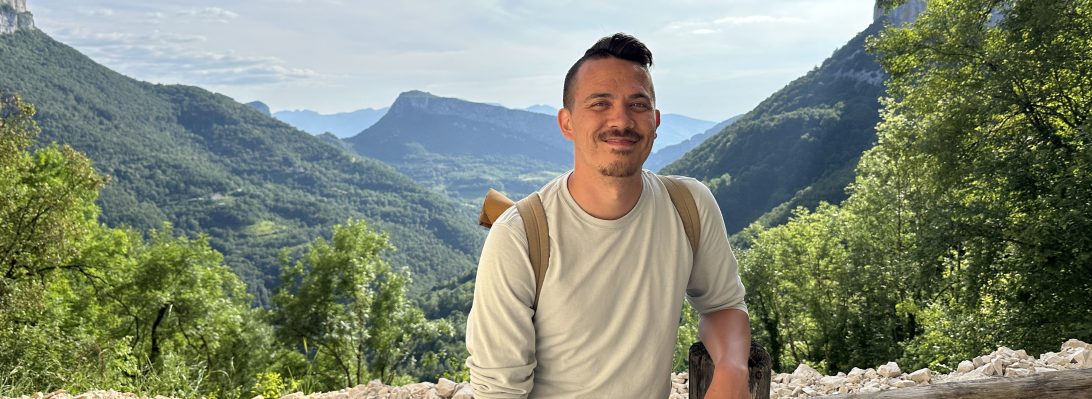 Last week I had the pleasure of seeing The Coming Out Monologues at the U of A. Riffing off pieces like The Vagina Monologues and The Laramie Project, it was a play based entirely on the true stories of the people onstage coming out of the closet. I never get enough of these stories, and I loved their sincerity and vulnerability. Some of the performers were young, some were old, some had relatively painless transitions, and others ended decades-long relationships with straight partners. Most ended on something like a happy ending.
Last week I had the pleasure of seeing The Coming Out Monologues at the U of A. Riffing off pieces like The Vagina Monologues and The Laramie Project, it was a play based entirely on the true stories of the people onstage coming out of the closet. I never get enough of these stories, and I loved their sincerity and vulnerability. Some of the performers were young, some were old, some had relatively painless transitions, and others ended decades-long relationships with straight partners. Most ended on something like a happy ending.
Except… a lot also ended saying something like, ‘It was tough getting people to accept who I really am, but things got better once they saw how normal I am too.” Which made me squirm. Is this the world we really want to make for ourselves?
I can attest that folks in the queer community spend a lot of time trying to be “normal” — as in, act straight. I do it all the time, often without even thinking about it. Is this underwear too gay to wear to the gym? Which part of the ceiling should I look at to avoid telling this group of guys I don’t like golf?
I remember bumping into an old drama teacher and her husband at a coffee shop when the Canadian government legalized same-sex marriage. They were telling me they couldn’t understand why it had taken so long for legal recognition, because it was so silly to think that two men being able to get married would affect everybody else’s relationship. Your marriage has no impact on ours, they reassured me.
But why shouldn’t it?
This kind of “normalizing” is a way of convincing ourselves that the Home Improvement, King of Queens, Everybody Loves Raymond-style straight, monogamous relationships in the mainstream essentially have it perfect, and that we can and should emulate them. More insidiously, it also implies that they have nothing to learn from us.

I learn a lot from glances into my friends Meagh and Claire‘s relationship. I think they model a lot of things queer partners negotiate that most straight couples I know rarely think about. For an average hetero couple, how often do serious conversations come up about what it means that the man almost always drives? Not often, right?
But Meagh and Claire have had ongoing, loving talks about how they feel about their gender and their roles together. Is it okay to be a queer girl and wear lipstick and heels? Do my body parts match the way I feel inside? Do we want to use “she” all the time when we talk about each other? I don’t think Claire would mind me telling you she calls herself the feelings-top of the relationship.
It’s not fair to say that this happens in every queer relationship, because there are a near-infinite variety and queer folks are like the queens of experimentation. But because we don’t have many models of how they’re supposed to work, I think it’s fair to say it’s way more common to actively negotiate these things. Would it be the worst thing in the world for straight couples to learn something from this?
I’ve had second dates spent getting slurpees and analyzing the merits of monogamy and polygamy. For me, monogamy seems to offer more warmth and safety. But because so many gay couples try other things, the conversation comes up.
You may have seen those videos last year of a young man defending how well he was raised by his lesbian moms, and of a couple’s life through the eyes of one partner who’s only revealed to be a man too when he proposes at the very end. My friend Rosa did a brilliant dissection of the message those videos send. They’re both beautiful (and I’ve cried watching them for sure). She says, though…
The contradictory emotional state that each of them left me in was similar to that of an amateur drag show: delight, horror, inability to look away. But these videos were actually nothing like an amateur drag show; they were totally un-glittery; totally un-queer.
The young man is talking about his two moms to challenge the Iowa Senate’s bid to outlaw same-sex marriage by arguing that the sexual orientation of his parents “has had zero effect on the content of [his] character.” He seems like an upstanding and accomplished guy, for sure. But Rosa imagines writing him this in a letter:
Actually, it probably had a massive effect on the content of your character; you probably are smarter, stronger and more critical because of the sexual orientation of your parents. Because you realized that your moms and your family had to deal with a lot of discrimination, you probably have a greater sense of justice, a more open mind, a deeper political engagement. The audience should be applauding you for this, but not for a statement that perpetuates an idea that homosexuality is okay only if it is, well, just like heterosexuality.
I couldn’t agree with her more.
I want to learn from the people around me. I want to learn from the young parents across my street who just adopted. I want to learn from the family friends who’ve divorced and still take an active role in their kids’ lives. I want to learn from the people who try having two partners at once, even if it ends in tears. This is what we do. We learn from each other.
If you’re ready for an extremely not-safe-for-work blog, HOMO Online offers some brilliant tidbits about “seek[ing] communion with men like ourselves who reject heteronorms, queer-puritanism, airy-fairyism, consumerist-faggotry and the like.” They want to reclaim the closet, as an idea that queer men should carve out some spaces just for ourselves (including theirs online, which unapologetically features copious amounts of porn mixed with art and social commentary).
If you like Tim Taylor’s style of nuclear family, that’s okay, too. But can we agree that it’s a better thing to arrive at those decisions intentionally — and that straight folks might actually have something to learn from the pantheon of queer models too?

very insightful and balanced. Many of us struggle with this question of what progress for queer identity means – the assimilationist acceptance route or the carving out of a space all our own instead of making room within someone else’s. The gay lib movement unapologetically and radically rejected overt heteronormativity and while that has worn down in its fervour its ideas still remain. I think the overt front of gay lib needs much more respect – it was this attitude that paved the way for the rest of us to be able to come out. however, while it was radical the gay lib movement was heavily focused on educating people on homosexuality, something I think we today take for granted that people should automatically know and if they don’t we call them homophobic instead of uninformed. Thanks for writing! 🙂
Jordan
Great post, Chris. Discussions of gender roles and relationship types are more explicit by necessity in queer relationships. It’s harder to take anything for granted, though there’s the perennial stereotypes about personality traits matching sex role preference and that kind of thing. On two separate dates with two different guys I’ve been told that I’m “the girl”. As if there had to be a “girl”, whatever that means. Next time someone says this, I’m determined to tell him to change his online dating profile settings if he’s looking for a girl. Despite this, there is a freeing lack of determined-ness to how queer dating is supposed to happen and I have also had positive experiences negotiating this in an intentional and respectful way.
Great article, Chris! I’m so happy we had a queer wedding in high school.
I am too, Rosa Gaia. So so happy.